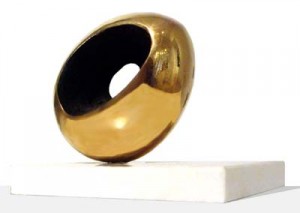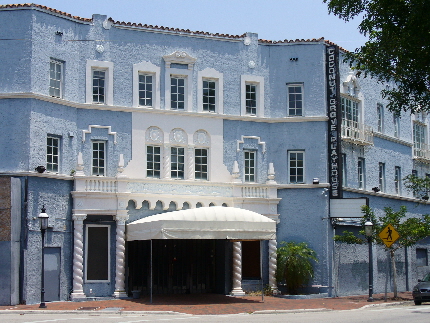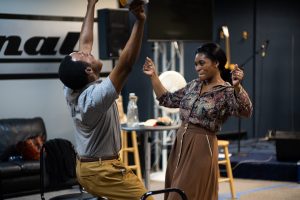 By Bill Hirschman
By Bill Hirschman
Other than two crippling developments, South Florida theater 2019 was marked by a wide array of what seemed like points on a volatile stock market chart marking the ebb and flow of an evolving arts community.
Welcome to our annual idiosyncratic highly-subjective look back on the year.
Because this critic is a Carbonell judge and we vote next month, it would be uncomfortable and misleading to list a top 10 or 20 or 23 titles and performances. But there were plenty of metaphoric comedies, tragedies, production numbers and, through it all, dramas — on and off the stage.
The seismic events were the Maltz Jupiter Theatre pulling out of the Carbonell Awards and the tumultuous battle in Miami city hall in the drive to reopen the Coconut Grove Playhouse, an effort now stalled in the court system.
 In September, Maltz Producing Artistic Director and CEO Andrew Kato sent a brief note to the Carbonell board pulling out of consideration not just for the next season but the season already two-thirds over. He felt his company’s work has not been judged fairly and that his entreaties had not been addressed.
In September, Maltz Producing Artistic Director and CEO Andrew Kato sent a brief note to the Carbonell board pulling out of consideration not just for the next season but the season already two-thirds over. He felt his company’s work has not been judged fairly and that his entreaties had not been addressed.
City Theatre Artistic Director Margaret M. Ledford had similar concerns and withdrew the annual Summer Shorts from consideration earlier this year, although she allowed its full-length productions to be eligible. And, in fact, one other company has spent the fall considering whether to withdraw.
Carbonell board members do not agree with some of the concerns, but are willing to have further conversations beside one held last summer. (Full disclosure: This critic has been involved with the program since 1998 as a nominator, briefly as unofficial administrator and currently as a judge.)
No judging system is even close to perfect, from the Tony Awards to the Nobel Prize, even with people exercising good judgment with the best intentions.
But whatever you think of the program or the legitimacy of the concerns or the board’s response, it is the effect of the pullouts that matters: When contenders are no longer in consideration, it weakens the stature of the awards that are given out. Obviously, those who have concerns already question the validity of the awards, but their actions weaken the fragile cohesiveness of community that the Carbonells have always championed. And it robs some likely candidates the chance of being honored.
The second controversy was the basis of a series of angry epic-length public hearings at Miami city hall fueled by hundreds of partisans and opponents to the far-along project to rebuild and reopen the Coconut Grove Playhouse, which has been closed since 2006. At issue is how large the new facility would be and how much of the 1926 venue would be restored or replaced.
 Years of work hit a brick wall when the Miami city commission in May failed to override the mayor’s veto of an earlier commission vote that did support the vision of Miami-Dade County for a 300-seat theater with classrooms and parking.
Years of work hit a brick wall when the Miami city commission in May failed to override the mayor’s veto of an earlier commission vote that did support the vision of Miami-Dade County for a 300-seat theater with classrooms and parking.
The county’s appeal has led to a Byzantine battle in county Circuit Court. The latest entry in court records – the 43rd since the case opened in June – is granting the “City Of Miami’s Motion To Accept Brief With Expanded Page Limits.” We are not making this up.
There will be a resolution someday, and that day could come sooner than most people expect, but it’s going to be a while and the outcome is anybody’s guess.
Otherwise, the state of the union for South Florida theater had more twists and turns than a script by Tom Stoppard. Here are some random observations.
* The national profile of South Florida theater, particularly the portion based in Miami-Dade County, got a major boost this June when Theatre Communications Group – the leading association of non-profit theaters in the country – held its national conference in Miami, due in part to the urgings of Michel Hausmann, artistic director and co-founder of Miami New Drama. Hundreds of theater professionals from one end of the country to the other got a first-hand glimpse of the variety, scope and depth of what the region has to offer.
 * Relatively new companies are finding their sea legs. Measure for Measure Theatre has been around two years but its rousing, epic-scaled production of In The Heights in its new home at the Sunrise Civic Center featured strong leads, unrestrained enthusiasm and stirring choreography, all of it signaling a promising future. New City Players near downtown Fort Lauderdale has been here five years but this past season produced some memorable works like Falling and A Raisin In the Sun that should encourage patrons to take a chance on anything they offer. It plans to take up permanent residence this spring in the new black box theater being renovated at ArtServe in Fort Lauderdale. The same can be said for Primal Forces in Boca Raton, which has once again posted a strong season with Having Our Say, Andy and the Orphans, and Blonde Poison, mostly work you have never heard of but which made converts among audience members.
* Relatively new companies are finding their sea legs. Measure for Measure Theatre has been around two years but its rousing, epic-scaled production of In The Heights in its new home at the Sunrise Civic Center featured strong leads, unrestrained enthusiasm and stirring choreography, all of it signaling a promising future. New City Players near downtown Fort Lauderdale has been here five years but this past season produced some memorable works like Falling and A Raisin In the Sun that should encourage patrons to take a chance on anything they offer. It plans to take up permanent residence this spring in the new black box theater being renovated at ArtServe in Fort Lauderdale. The same can be said for Primal Forces in Boca Raton, which has once again posted a strong season with Having Our Say, Andy and the Orphans, and Blonde Poison, mostly work you have never heard of but which made converts among audience members.
* Some established companies just get stronger and stronger. Island City Stage with its gay-centric mission sells out many of its performances in Wilton Manors and continues to upgrade its facilities, adding a tiny black box to its Wilton Theater Factory. City Theatre’s recent foray into full-length plays keeps offering worthwhile productions like The Cake at the Arsht Center. Area Stage’s plays in Miami, several directed by young Giancarlo Rodaz, are remarkably inventive like its recent Matilda, and boasts an unofficial repertory corps of actors who other artistic directors should be scoping out. Pembroke Pines Theater of the Performing Arts, a community theater for two decades, has gone professional this season with paid directors and performers. It’s been an especially landmark year for the 10-year-old Slow Burn Theater, which sold out many of its performances at the Broward Center, partnered with Jet Blue, extended its number of performances, has become an Equity house, and even had a billboard on I-595 for A Christmas Story. (The last local company I remember doing that was The Wick in its early days).
* Ignorant outsiders who have never travelled south of Times Square or Pennsylvania Avenue may still think of South Florida theater as the home of early Neil Simon and dinner theater. But we all know that the trend begun years ago of tackling challenging material and controversial thought-provoking material continues to dominate local programming. A few companies go the extra mile in taking on boundary-erasing material. Some of it works; some doesn’t. But the efforts of companies like Thinking Cap Theatre in Fort Lauderdale and Miami New Drama deserve ovations for expanding the fare available to those seeking more.
* Readings in the development process are now ubiquitous on local schedules at nearly every company. Jan McArt’s series at Lynn University stands out because playwrights get to work with paid casts for nearly a week. The South Florida Theatre League arranges weekly readings all summer at member theaters. GableStage hosts works in progress just as a mitzvah. And next month there are reading festivals at Palm Beach Dramaworks and Theatre Lab on the FAU campus which specializes in new work that later may become part of its slate of full productions.
* There were casualties: Playgroup LLC closed last month after nine years of presenting short and full length plays mostly by local playwrights. Outré Theatre Company, which has performed dramas, comedies and musicals with a unique vibe in a half-dozen venues, will play its last show A Skull in Connemara March 13-22 at the Willow Theatre in Boca Raton. The venerable Broward Stage Door shuttered, a tentpole company that once had the largest subscription base in the region and employed hundreds of local artists. The only good news was that its last venue at the Lauderhill Performing Arts Center is now hosting the Prather family’s Broadway Palm series of locally produced mainstream musicals and its national tours. Another company that shall remain nameless has been teetering on closing for some time and was close to it this year, but fortunately has announced a new season.
* There also were human losses, among them: Jerry Seltzer of Black Box Booking, and George Wentzler, a huge fan whose photography documented the otherwise ephemeral productions of smaller companies.
.
* With Gen-X, Gen-Y and Millennials heading more and more companies, theaters are wisely creating ever-more intriguing promotional videos for their websites and Facebook to build interest in their coming productions.
* Several musicals this season had huge casts, a couple putting more than 30 people on stage and a half-dozen or more musicians in the pit. The company officials assured us that they were paying everybody and while I would not doubt their veracity, I have to wonder whether some folks were paid in peanut butter & jelly sandwiches or gas money.
 * There are always surprises: Ronnie Larsen is best known here for writing and producing uninhibited broad gay-themed comedies with male nudity. But this season he wrote the one-woman comedy with a message Grindr Mom, a funny, subtle and tender story starring Jeni Hacker and directed by Stuart Meltzer, about a Mormon woman who discovers her son is gay. Even more surprising, he delivered – as both playwright and actor — An Evening With John Wayne Gacy Jr. Easily the most off-putting title for a theater piece in many years, it was still a surprisingly effective, harrowing and highly stylistic depiction of homicidal madness with Larsen giving a bravura performance.
* There are always surprises: Ronnie Larsen is best known here for writing and producing uninhibited broad gay-themed comedies with male nudity. But this season he wrote the one-woman comedy with a message Grindr Mom, a funny, subtle and tender story starring Jeni Hacker and directed by Stuart Meltzer, about a Mormon woman who discovers her son is gay. Even more surprising, he delivered – as both playwright and actor — An Evening With John Wayne Gacy Jr. Easily the most off-putting title for a theater piece in many years, it was still a surprisingly effective, harrowing and highly stylistic depiction of homicidal madness with Larsen giving a bravura performance.
* As South Florida increasingly becomes a cauldron for new works, audiences (and the theater artists themselves) have to relearn what we initially learned during the heyday of Florida Stage about expectations. In the brave new world of play development occurring before our eyes with readings, workshops and especially “world premieres,” few if any are ready for the kinds of standards and scrutiny mainstream audiences expect. It’s simply a given that since previews with audiences are minimal at best, these offerings usually will need more work. There’s nothing wrong with that and that’s the point: No one should expect a fully-formed fine-tuned work — and that includes artistic directors’ expectations – or be disappointed that all the considerable work in getting it developed and mounted is not the end of the journey.
* Here’s a secret to anyone except insiders: The tiny community of designers and support staff in this region are overworked and sometimes overbooked. Several troupes are forever scrambling to identify and hire reliable talent in sets, costumes, lights and sound. The designers who are located here do superb work, but there simply aren’t enough of them as any artistic director will tell you. So, mamas, don’t let your babies grow up to be actors; tell them to become scenic designers.
* Parking at the Arsht Center has been a disaster since it opened as the Carnival Center 13 years ago: insufficient spaces at exorbitant rates with no apparent regulation (“Hey, it’s less than what they charge in New York City” you can hear someone say). You have to wonder which brilliant visionaries running for office thought there was no need for the partnership to build its own parking garage with reasonable rates. Instead, they let the folks owning the land around the center keep that money-printing property. But that was 13 years ago. Now, these same public servants are allowing hundreds of spaces to be plowed under for various plans touted in various scenarios as (a) a park (b) a Lincoln Road-type pedestrian mall or maybe (c) a new Harry Potter / Star Wars site. And let’s not even mention whoever invented the new traffic pattern.
* Cellphone abuses have gotten worse and worse. Often ushers in some houses just sit back in their chairs once the lights go down or think they are doing their job by walking up the aisles flashing a sign that is pretty much ignored. I’m willing to add a dollar or two to my ticket price to arm ushers with tasers. Or, and I’m not joking here, how about giving them laser pointers to shine in the face of someone in the middle of a row texting their dog sitter as the overture starts? Some companies are fighting back with imaginative announcements like Theatre Lab’s wry video warning at Everything is Super Great. But even then people did not turn them off. It’s always fun watching some people struggling to figure out how to turn off their phone once it’s gone off in the middle of an impassioned monologue. But it’s worse than just technology. More and more, some patrons feel no compunction about talking through a show as if they were sitting in their living room. A colleague told me that when she complained to the ushers about a particularly nasty and incessant offender last month, the ushers suggested she move.
* The universe of locally-based artists keeps mutating like a creature on the old Star Trek, as it likely does in most regional theaters. But the South Florida community has lost and keeps losing a lot of home-grown talent, both young and experienced. To list names would depress you. Some of it is due to admirable ambition, but it’s as much a lack of opportunities. And it doesn’t help that there is the tiniest uptick in hiring people from outside the region. One production which will remain nameless had two locals in a cast of a dozen and those were in secondary roles — even though it was a show that easily could have been cast entirely locally; casting people simply weren’t looking very hard or reaching out. Granted there are some shallow aspects of the local casting pool, starting with middle-aged African-American men. The encouraging news is that if you see as much theater as I do across the entire region, you realize that new generations keep appearing, arriving and developing. Another one has popped up over the past few years and while some of its members need on-the-boards experience to grow to the next level (does any Florida professional take classes anymore?) they have formed the next core of the corps.
So goodbye and Godspeed to 2019. Looking ahead, the calendar is filled with promising titles to make any theater aficionado salivate, no matter what sub-genre they prize. See you there. We can hardly wait. (Can you spell Hamilton?)









 A PaperStreet Web Design
A PaperStreet Web Design

One Response to South Florida Theater 2019: It Was The Best Of Times, It Was The … Well, You Know